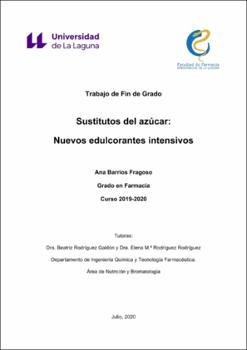Sustitutos del azúcar: nuevos edulcorantes intensivos.
Author
Barrios Fragoso, AnaDate
2020Abstract
Debido a los efectos negativos para la salud del consumo de azúcar, desde hace muchos
años se están buscando alternativas. La reducción o sustitución de la sacarosa manteniendo
la dulzura del alimento ha sido y es un reto para la industria alimentaria, pero hoy en día hay
numerosos sustitutos del azúcar. Entre ellos se encuentran los edulcorantes sintéticos y
naturales, siendo sacarina (sintético) y estevia (natural) los más consumidos.
Estos edulcorantes son una buena alternativa para sustituir los sabores dulces sin la
respuesta fisiológica generada por el consumo de azúcares. Además, proporcionan un
agradable sabor dulce, no aportan energía (salvo excepciones), no favorecen la caries dental
y son inocuos en las cantidades permitidas. Éstos, por sí solos, no son suficientes para
controlar el peso por lo que su consumo debe ir acompañado de una dieta equilibrada y un
estilo de vida saludable que incluya actividad física.
Actualmente se está investigando en los llamados edulcorantes intensivos, los cuales tienen
un poder edulcorante muy superior al de la sacarosa, y entre los cuales se encuentran
neotame y advantame.
El consumo de edulcorantes se está incrementando notablemente, por lo que se está
estudiando si realmente son una buena opción para disminuir los efectos de enfermedades
tales como obesidad y diabetes. Due to the negative health effects of sugar consumption, alternatives have been sought for many years. Reducing or substituting sucrose while maintaining the sweetness of the food has been and is a challenge for the food industry, but today there are numerous sugar substitutes. Among them are synthetic and natural sweeteners, with saccharine (synthetic) and stevia (natural) being the most consumed.
These sweeteners are a good alternative to replace sweet flavours without the physiological response generated by the consumption of sugars. In addition, they provide a pleasant sweet taste, do not provide energy (with few exceptions), do not promote dental caries and are harmless in the permitted quantities. They are not sufficient on their own to control weight, so their consumption must be accompanied by a balanced diet and a healthy lifestyle that includes physical activity.
Research is currently being conducted on so-called intensive sweeteners, which have a much higher sweetening power than sucrose, and among which are neotame and advantame.
The consumption of sweeteners is increasing notably, so it is being studied if they are really
a good option to diminish the effects of diseases such as obesity and diabetes.





